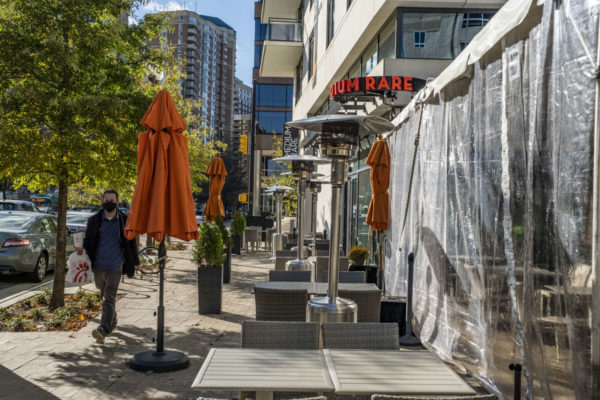As the November chill setting in, Arlington County restaurants are taking steps to keep guests cozy as they eat at impromptu patios.
Outdoor dining continues to be an option for restaurants that want to seat more customers while keeping indoor occupancy low. But some Arlington restaurant owners are facing hurdles outfitting their space with heaters and extra seating while meeting local and state laws.
So far, the County has approved 21 requests for propane heaters. But some restaurants, including Medium Rare in Virginia Square, do not have enough outdoor space to keep their guests warm while meeting state fire codes.
Medium Rare’s owner, Mark Bucher, said he and other Arlington restaurant owners are being forced to choose among three bad options: close the outdoor seating space, spend thousands of dollars on electric heating, or break the law and put up propane heaters anyway.
Bucher, who has been organizing large-scale free meal deliveries during the pandemic, has started asking the County to cut the red tape that he says is making it harder to expand patio seating and subsequently, set up heaters.
“Arlington, which is normally the most business-friendly jurisdiction in the area, has been the worst on this,” said Bucher, who also operates in Bethesda and D.C. “There has been no proactive outreach.”
Arlington County spokeswoman Erika Moore said the County is taking steps to help businesses transition to winter.
“The Arlington County Fire Prevention Office is working hard to ensure businesses can remain open and operating as we move to colder weather,” she said in an email.
Part of the space issue stems back to the summer, when some Arlingtonians wanted to see streets closed so tables and chairs could spill into the street. But this never happened, due to a lack of resources and manpower, county officials said in October. A number of temporary outdoor seating areas were approved, and in some cases street parking spaces were used to help accommodate them, but bolder action was not taken.
Neighboring Fairfax County, meanwhile voted last month to relax regulations around tents and heaters.
With winter near, restaurant owners in Arlington do not just need space for outdoor seating, Bucher said, they need space to install heaters according to code. Propane heaters, for example, have to be five feet from buildings and exits, and cannot be under tents or canopies.
There’s a permit process that must be followed, which involves submitting a permit for heaters and possibly re-submitting a permit to change a restaurant’s set-up for outdoor seating. That all takes time, and restaurants are running out of time.
Out of desperation, in areas where seating is limited to sidewalks, some restaurants are putting up heaters anyway.
“People are doing it, but technically, you’re not allowed to have one,” Bucher said.
He said he tried to install a silent, diesel-powered, zero-emission heater at the Arlington Medium Rare, but was informed that also did not meet code.
Bucher said the problem is “an old fire code that is antiquated,” as well as overzealous enforcement.
“No one has said, ‘We’re going to hold off on this so that restaurants can have seating,'” he said.
Good morning. We know this is an area of concern and have approved 21 permits for outdoor gas heaters since September. There are state fire codes restricting their use, but we are assisting local businesses to the extent that we can. Link to more info ⬇️ https://t.co/98L0wQaHJi
— Arlington Fire (@ArlingtonVaFD) November 18, 2020
Moore said Arlington County has helped create more seating for restaurant, approving 92 temporary outdoor seating areas that added more than 900 temporary outdoor tables countywide.
“Some of these have involved temporarily repurposing portions of public rights of way to increase space for restaurant seating, including in the Shirlington and Clarendon neighborhoods,” she said.
The County also has published a guide for transitioning to winter that addresses the commercial use of tents and heaters and recommends blankets, hand-warmers, cozy food and drinks and prix fixe menus. But even the warmest of drinks is unlikely to do much to boost business during the coldest of winter nights.
Bucher said Arlington should look to D.C. and Montgomery County, which are issuing grants specifically for restaurants to winterize, and have taken steps to close parts of streets for extra seating.
In D.C., 428 restaurants have received $2.6 million in funds to winterize, DCist reports, and the government still has $1.4 million to distribute. Restaurants in Montgomery County can apply for grants worth up to $10,000.
This summer, the County did award $2.8 million to nearly 400 small businesses through the Small Business Emergency GRANT Program, which “helped small businesses, including restaurants, transition as needed to operate during COVID,” Moore said.
To create more space D.C. shut down metered parking to create “streateries” in some areas, Bucher said. In Arlington, the process to expand patio seating is still beset with applications and fees, despite the extraordinary times, he added.
“I have to pay fees in a pandemic?” he asked.


